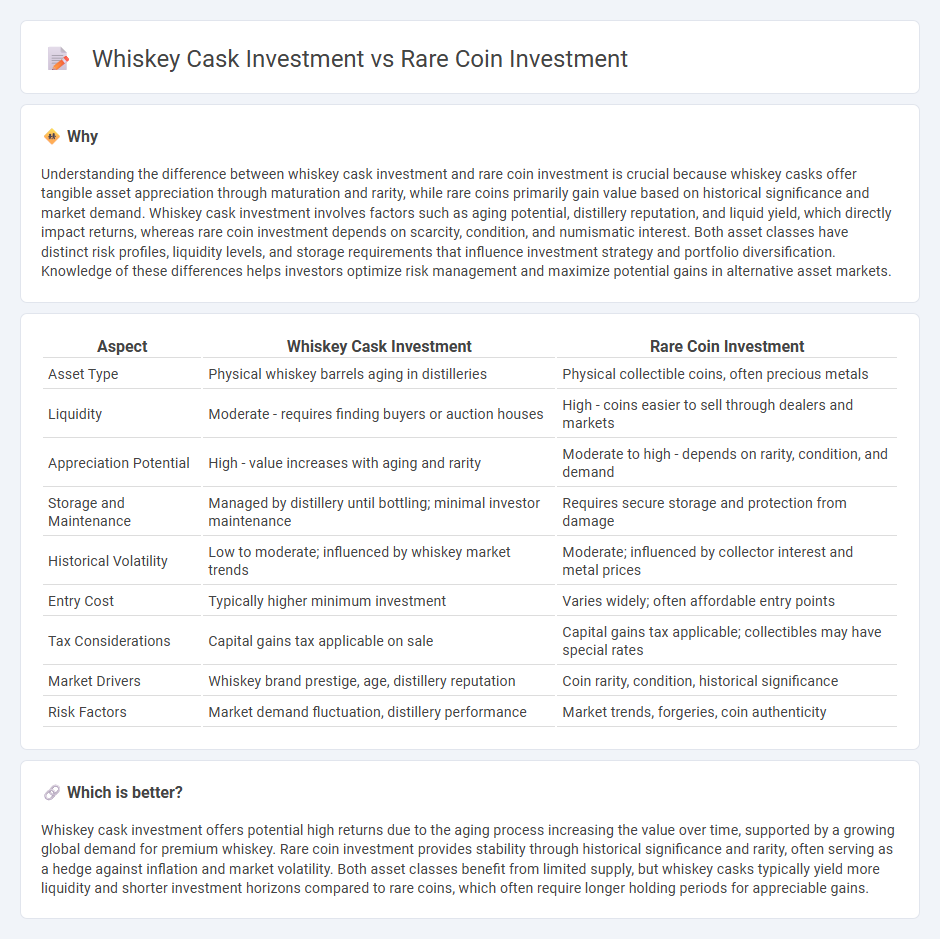
Whiskey cask investment offers a tangible asset with potential appreciation driven by aging and limited production, often appealing to connoisseurs and collectors. Rare coin investment provides liquidity and historical value, backed by scarcity, metal content, and numismatic significance. Explore the unique benefits and risks of both markets to determine the best fit for your portfolio.
Why it is important
Understanding the difference between whiskey cask investment and rare coin investment is crucial because whiskey casks offer tangible asset appreciation through maturation and rarity, while rare coins primarily gain value based on historical significance and market demand. Whiskey cask investment involves factors such as aging potential, distillery reputation, and liquid yield, which directly impact returns, whereas rare coin investment depends on scarcity, condition, and numismatic interest. Both asset classes have distinct risk profiles, liquidity levels, and storage requirements that influence investment strategy and portfolio diversification. Knowledge of these differences helps investors optimize risk management and maximize potential gains in alternative asset markets.
Comparison Table
| Aspect | Whiskey Cask Investment | Rare Coin Investment |
|---|---|---|
| Asset Type | Physical whiskey barrels aging in distilleries | Physical collectible coins, often precious metals |
| Liquidity | Moderate - requires finding buyers or auction houses | High - coins easier to sell through dealers and markets |
| Appreciation Potential | High - value increases with aging and rarity | Moderate to high - depends on rarity, condition, and demand |
| Storage and Maintenance | Managed by distillery until bottling; minimal investor maintenance | Requires secure storage and protection from damage |
| Historical Volatility | Low to moderate; influenced by whiskey market trends | Moderate; influenced by collector interest and metal prices |
| Entry Cost | Typically higher minimum investment | Varies widely; often affordable entry points |
| Tax Considerations | Capital gains tax applicable on sale | Capital gains tax applicable; collectibles may have special rates |
| Market Drivers | Whiskey brand prestige, age, distillery reputation | Coin rarity, condition, historical significance |
| Risk Factors | Market demand fluctuation, distillery performance | Market trends, forgeries, coin authenticity |
Which is better?
Whiskey cask investment offers potential high returns due to the aging process increasing the value over time, supported by a growing global demand for premium whiskey. Rare coin investment provides stability through historical significance and rarity, often serving as a hedge against inflation and market volatility. Both asset classes benefit from limited supply, but whiskey casks typically yield more liquidity and shorter investment horizons compared to rare coins, which often require longer holding periods for appreciable gains.
Connection
Whiskey cask investment and rare coin investment both offer alternative asset classes that appeal to collectors and investors seeking portfolio diversification beyond traditional stocks and bonds. Both markets rely on scarcity, historical significance, and tangible assets, which drive valuation and potential appreciation over time. Investors benefit from regulated trading platforms and expert appraisals that enhance transparency and liquidity in these niche investment sectors.
Key Terms
Rare coin investment:
Rare coin investment offers tangible assets with historical significance and intrinsic value, often appreciating due to rarity, condition, and market demand. Unlike whiskey cask investment, rare coins benefit from a well-established global market and easier liquidity. Explore the nuanced benefits and risks of rare coin investment to make an informed decision.
Numismatic value
Rare coin investment leverages numismatic value, which depends on rarity, historical significance, condition, and demand within collector markets. Whiskey cask investment, by contrast, is driven primarily by the cask's maturation potential and brand prestige rather than inherent historical value. Explore the nuances between numismatic value and liquid asset appreciation to make informed investment choices.
Grading
Rare coin investment relies heavily on numerical grading scales like the Sheldon Scale to assess authenticity, condition, and market value, impacting liquidity and resale potential significantly. Whiskey cask investment grading focuses on factors such as cask type, age, maturation process, and distillery reputation, which influence flavor profile and rarity but lack a standardized grading system. Explore the nuances of grading in these unique investment opportunities to make informed decisions.
Source and External Links
Investing in Rare Coins | SoFi - Rare coins are alternative collectible assets offering potential returns and diversification, but require due diligence due to risks like fraud, forgery, and market volatility.
Rare Coins, Currency & Bullion Archives - Tangible Investments - Rare coins combine historical collecting with financial growth, offering liquidity by easy authentication and a historical track record of outperforming traditional markets.
Rare Coin Investments | Olevian Numismatic Rarities - Rare coins have provided strong returns for decades, especially for informed investors, and third-party grading services now make it easier to buy authenticated, high-quality coins.
 dowidth.com
dowidth.com